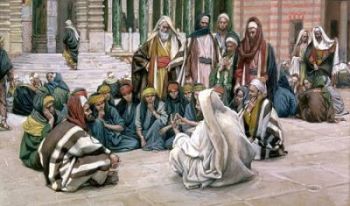
Remember the story of the rich young man in the gospels. He had everything and was probably the envy of everyone in town. And besides being wealthy and prominent he was a God-fearing man. When he met Jesus he told Jesus that he had been faithful to the law since he was a young boy. What self-esteem that young man must have had. Besides being blessed with an abundant material life, he was also faithful to his religious tradition.
Yet, this man, who had it all, had an emptiness inside him. He knew there was something missing, and when he listened to Jesus he had a sense that this holy man from Nazareth held the key to what he was looking for. When Jesus challenged him to leave all his possessions and follow him, the man became sad. He wanted Jesus but he also wanted to be rich. Instead of risking his old identity to find a deeper one, he bowed his head and walked away from Jesus.
When we surrender all to follow Jesus, no matter what our life conditions, we take on a new, deeper identity.
Jesus explains this dramatically in today’s gospel reading (Mark 3:31-35).
“The mother of Jesus and his brothers arrived at the house. Standing outside, they sent word to Jesus and called to him. A crowd seated around him told him, ‘Your mother and your brothers and your sisters are outside asking for you.’”
Jesus’ fundamental identity was being a son of Mary and a brother to those family members he grew up with. These are the ones he felt closest to in his life. From this little band of family remembers he received a secure sense of who he was. And, yet, as we learn, Jesus had a deeper identity than family membership. Listen to how he responded to those who interrupted his teaching to let him know his mother was standing outside.
“But he said to them in reply, ‘Who are my mother and brothers. For whoever does the will of God is my brother and sister and mother.’”
The little band of followers who were sitting around the feet of Jesus had a deeper identity than his own family members—those who grew up with him and knew more about him than anyone else could. The ones who seek Jesus first and put God’s will as their guiding principle, enter into a new level of life. They now have God as their father and the Son of God as their brother. They have chosen to let their “growing up” identity, give way to the new identity that comes with being one with Jesus.
On this same note, our first reading (2 Samuel 6:12-19) shows us a side of King David that his relatives, especially his wife, found embarrassing. David had the strongest identity in Israel. He was handsome, talented, a strong warrior, the greatest king on earth. Everyone looked up to him. Israel received their pride as a nation by looking upon King David. Yet when the town celebrated the return of the ark of the covenant, David yielded his royal identity to a deeper identity. We read,
“Then David, girt with a linen apron, came dancing before the Lord with abandon, as he and all the house of Israel were bringing up the ark of the Lord with shouts of joy and to the sound of the horn.”
Imagine that! The king took off his royal robes and danced as though he were a slave boy. He was acting as a joyful, playful son of God instead of a strong king. So much did he love God that he danced “with abandon.” Being God’s “little boy” was more important to David than being the most admired man in the land. And, he wasn’t ashamed of showing his deeper identity to the people—surrendering his role. In doing this he presented a model to the men of Israel. None could be a warrior king, but all could be God’s “little boys.” Dancing for God was something they all could do.
Like the rich man of the gospel story we all get caught up in an identity that is honored by the world—rich, prominent, talented, successful, flawless, intelligent. This makes us feel important. Are we, however, free enough to let go, as David did, and assume our deeper identity as children of God and brothers and sisters of Jesus? Do we realize what happened to us when we were baptized? We were clothed with a new identity when we allowed the life of the Holy Spirit to make its residence inside us. Let us be as those who sat at the feet of Jesus doing the Father’s will. Let us put being identified with Jesus above all else—even when it hurts and it draws criticism from others.
“Blessed ae you, Father, Lord of heaven and earth; you have revealed to the little ones the mysteries of the Kingdom” (Matthew 11:25).
